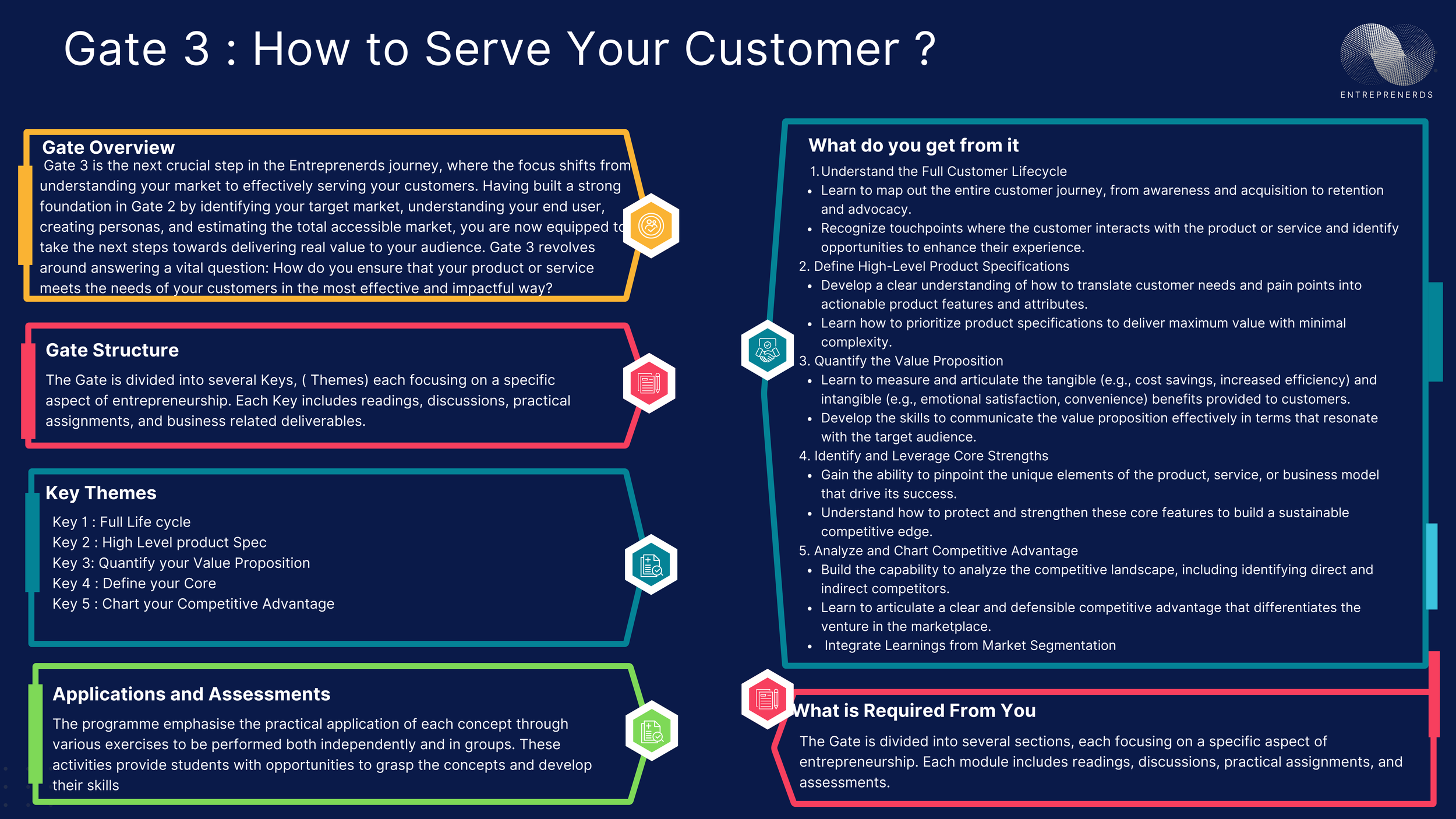Gate 3: How to Serve Your Customer
Deliver Real Value
Gate 3: How to Serve Your Customer
The big question: How can you be sure your solution really fits what people need?
Welcome to Gate 3! Now that you know who your customer is, it’s time to learn how to really make them happy. This gate is all about delivering value: making sure your product or service actually meets your users’ needs (and wow’s them in the process). We’ll help you map out your customer’s entire journey with your product – from the first time they hear about it to becoming a loyal fan – so nothing falls through the cracks
Gate 3 revolves around answering a vital question: How do you ensure that your product or service meets the needs of your customers in the most effective and impactful way?
Gate Structure
The Gate is divided into several Keys ( Themes), each focusing on a specific aspect of entrepreneurship. Each Key includes readings, discussions, practical assignments, and business-related deliverables. Don’t worry, we have templates and examples for every step
Themes You Will Cover
To achieve this, you’ll explore the following five essential keys:
Key 1 : Full Life Cycle
Key 2 : High-Level product Spec
Key 3: Quantify your Value Proposition
Key 4 : Define your Core
Key 5 : Chart your Competitive Advantage
What you will get from the Gate
See the whole journey of your customer – from the moment they discover your product to the point they become repeat users. (You’ll learn to think like your customer at every step.)
Outline your product’s key features in plain language, so you’re clear on how it solves the customer’s problem
Learn to measure your value: figure out exactly how your product makes a difference for users (in time saved, money saved, happiness gained – whatever matters).
Pinpoint what makes your solution special at its core (what you do better or differently than anyone else).
Chart out why you’re better than the competition in a way that’s easy to see and explain.
How we Support You
We will provide support throughout your learning experience. Your learning Success manager will be available to support you if you have any questions or need any help. You can also schedule one session with a mentor to discuss entrepreneurship questions related to this gate.
Delivery System
Applications Exercises of each Theme
Concept Notes
Videos Explaining Each Concept by Experts and Entrepreneurs
Webinars to discuss the themes with students
Thematic Interactive Discussion with the Learners
Peer Evaluation
Mentorship Session
Virtual Class
Assessments
Your New Venture After This Gate
Full Life Cycle: Map out the entire journey of your customer with your product or service, from discovery to repeat use, ensuring a seamless and satisfying experience.
High-Level Product Specification: Define the core features and attributes of your offering that will meet customer needs and differentiate your solution in the market.
Quantify Your Value Proposition: Clearly measure and articulate the tangible and intangible benefits your product provides to customers, showcasing why they should choose you.
Define Your Core: Identify the unique aspects of your product, service, or business model that drive its success and make it difficult for competitors to replicate.
Chart Your Competitive Advantage: Develop a clear understanding of your competitive landscape and articulate the advantages that set your venture apart.
What is Required of You
The gate is divided into several sections, each focusing on a specific aspect of entrepreneurship. Each module includes readings, discussions, practical assignments, and assessments.
Delivery Platform
The Gate is delivered through our online platform, Entreprenerds Space. Delegates can access the platform online or via their mobile app, allowing them to participate in the programme on the go, even offline
Badge 1: Value Designer
-
SKILLS
1. Full lifecycle mapping
2. Jobs-to-Be-Done (JTBD) framing
3. High-level product specification
4. Product–Persona alignment
5. Value proposition design
6. Quantifying benefits
7. Brochure/digital pitch creation
-
USE CASE
1. Designing customer-centric products and services
2. Understanding deeper customer motivations and context
3. Communicating your product clearly to teams, mentors, or developers
4. Ensuring features match real needs, not guesses
5. Crafting clear, compelling benefit statements
6. Pitching with measurable outcomes (time saved, money gained, etc.)
7. Building marketing mockups, prototypes, or investor decks
-
SKILLS
1. Core capability analysis
2. Moat definition (IP, networks, expertise)
3. Competitive positioning
4. Status quo disruption strategy
5. Visual 2x2 matrix plotting
6. Customer-first comparison
-
USE CASE
1. Identifying what makes your team or product hard to copy
2 Developing defensible advantages for your business
3. Mapping your strengths vs. market alternatives
4. Showing customers why doing nothing is no longer an option
5. Creating persuasive visuals to pitch superiority or niche value
6. Translating internal strengths into customer-relevant messaging
Real World Applications
Startup validation & pitching – Stronger founder decks and competition entries
Product design – Improved briefs for development or MVP building
Marketing & sales – Clear positioning and messaging around customer value
Employment – Ideal for roles in product, strategy, marketing, or design
Academic projects – Adds structure and depth to design thinking or innovation coursework.

